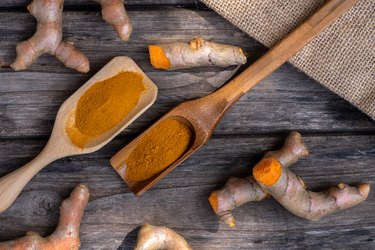
A stomach ache may be accompanied by a range of unpleasant symptoms such as sharp or burning pain, cramping, nausea, vomiting or diarrhea. Clear fluids and other drinks that help stomach aches can ease abdominal discomforts and maintain hydration without irritating the stomach. Eating bland foods also helps soothe an upset stomach.
Tip
Drinks that help stomach aches include water, decaffeinated tea, diluted juices, clear broth, ginger ale or tea and peppermint tea.
Video of the Day
Stomach Ache Causes
A stomach ache can be caused by a variety of conditions such as a viral infection, overeating or difficulty digesting a certain type of food. Abdominal pain may also be accompanied by nausea, vomiting or diarrhea depending on the cause. A stomach ache can present in several ways and can indicate different ailments based on the type or location of the pain:
Video of the Day
- Widespread pain around the abdomen: virus or indigestion
- Pain in one location: appendicitis or gastritis; a burning pain in the stomach
- Cramping: gas and pressure from bloating
- Intense pain that comes and goes: gallbladder
Upset Stomach Remedy: Clear Fluids
Clear fluids prevent dehydration and are easy to digest on an upset stomach. Drinks that help stomach aches include water, decaffeinated tea, diluted apple or grape juice, ginger ale or lemon-lime soda and clear broths. These beverages maintain hydration and are less likely to exacerbate a stomach ache than other foods or drinks.
Individuals with a stomach ache can also take in fluids by eating ice chips, flavored gelatin or fruit-flavored ice pops. Avoid dairy beverages, caffeinated drinks and alcohol because they can worsen an upset stomach.
Nausea, Vomiting and Diarrhea
It is important to replace fluids lost by vomiting, diarrhea or sweating from a fever, but drinking a large volume all at once may trigger additional nausea and vomiting. It's gentler on the stomach to take small, frequent sips. Sugary drinks, such as soda, sports drinks and undiluted juices, can make diarrhea worse, so opt for broth, diluted juice and tea instead.
According to a 2016 study published in Integrative Medicine Insights, phytochemicals in ginger can be effective for treating nausea and vomiting. Teas brewed with ginger make a soothing drink for an upset stomach. Drink in moderation because consuming too much ginger can cause heartburn.
Relieving Gas and Indigestion
A stomach ache after a meal — especially a large, fatty or spicy meal — may feel like sharp pain, burning pain or bloating. Drinks that help stomach aches caused by indigestion include carbonated water and club soda, because the higher pH neutralizes some of the excess acid in the stomach. Also, burping due to the carbonation relieves some of the gas pressure.
Abdominal pain in the intestines may be soothed by peppermint tea, which relaxes the gut muscles that are stretched due to gas. Drinking water helps to move the gas along the gastrointestinal tract where it eventually can be passed.
Foods for Stomach Ache
Maintain a clear liquid diet until vomiting and diarrhea subside, and symptoms of pain and nausea have improved. Reintroduce solid foods gradually, opting for bland, easily digestible offerings such as plain white toast, saltine crackers, applesauce and bananas. Spicy, fatty, high-fiber or dairy foods are harder on the digestive system and can cause abdominal symptoms to worsen.
A bland diet is easy on the stomach but low in nutrients. Stick with simple, easily-digestible foods for one to two days after vomiting and diarrhea have stopped. Fruits, vegetables, whole grains and other nutrient-dense foods can then be incorporated to resume a normal diet.
When to Seek Medical Attention
Stomach ache is often a symptom of a temporary digestive disorder or viral infection. However, a stomach ache can sometimes be a sign of a more serious condition. Call the doctor if the abdomen is rigid, there is a fever, diarrhea lasts five or more days or if the stomach discomfort persists for a week or more and natural remedies for an upset stomach don't help.
Some symptoms are more worrying and warrant a trip to the emergency room. Seek immediate medical attention if a stomach ache is accompanied by difficulty breathing, neck or shoulder pain with nausea, vaginal bleeding or if there is blood in your vomit or stool.
- MedLinePlus: "Abdominal Pain"
- Mayo Clinic: "Gastroenteritis- First Aid"
- Harvard Health Publishing: "When Treating Stomach Bugs, the Best Solution May be the Simplest One"
- University of Wisconsin-Madison Health Services: "Upset Stomach"
- Integrative Medicine Insights: "The Effectiveness of Ginger in the Prevention of Nausea and Vomiting During Pregnancy and Chemotherapy"